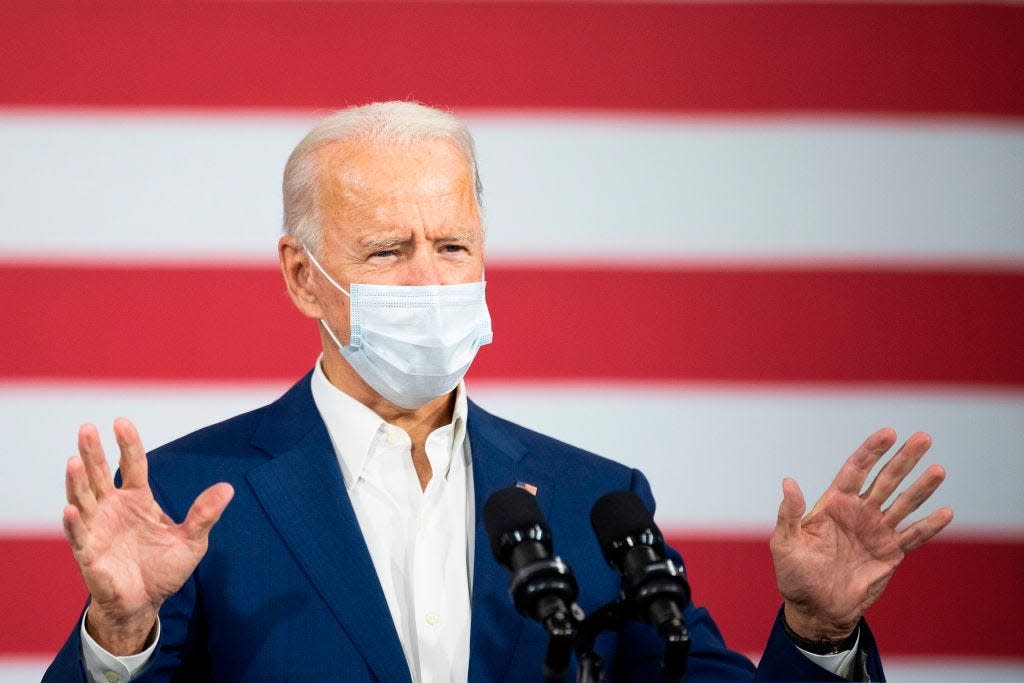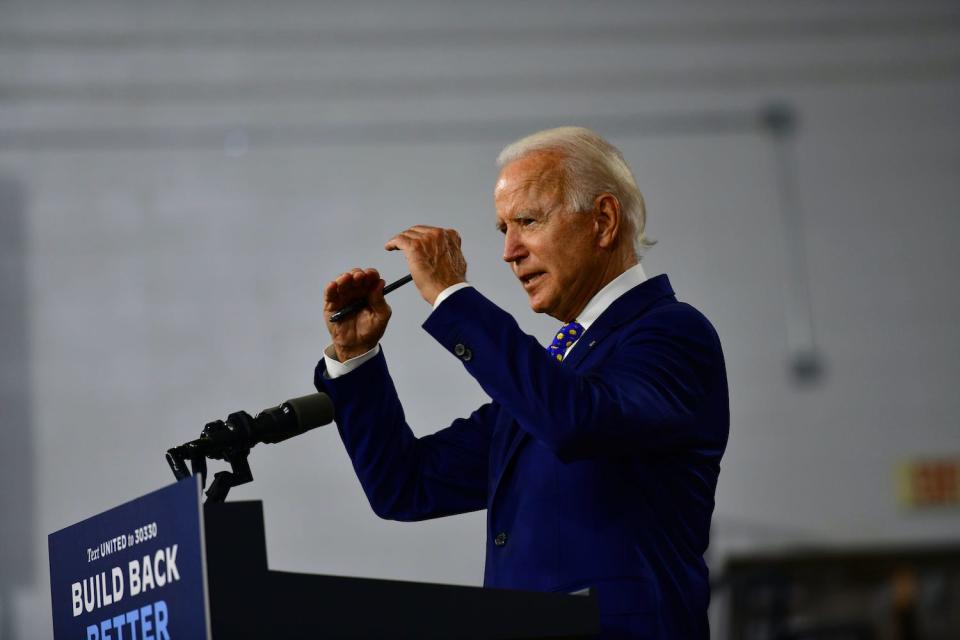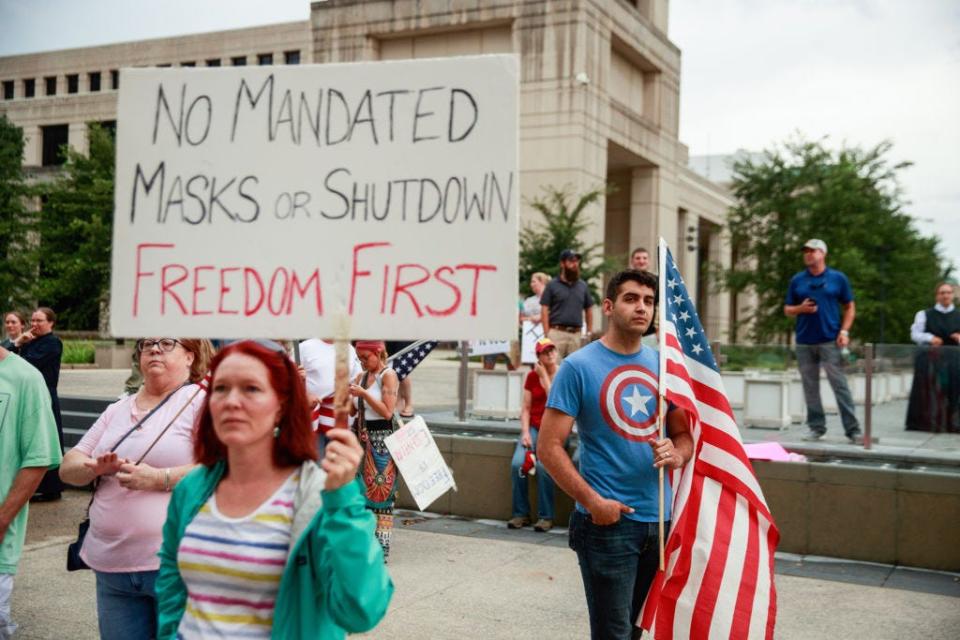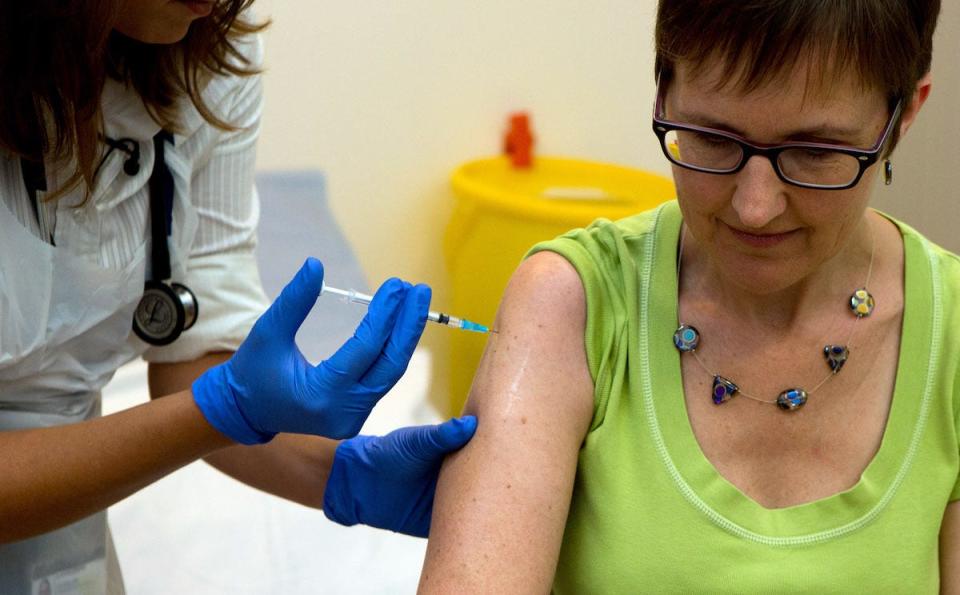Joe Biden's coronavirus strategy is missing one thing, experts say: a plan to bring the country back together

Jim Watson/AFP via Getty Images
Joe Biden has a seven-point plan to tackle the pandemic if he gets elected. It includes elevating the voices of scientists and ramping up contact tracing.
But public-health experts say one thing is missing from Biden's approach: a clear strategy to bring the country together.
Experts fear the outbreak won't come to an end until Americans accept the science on mask wearing and vaccine safety.
It was a phrase Joe Biden returned to repeatedly during the first presidential debate: "The president has no plan."
Public-health experts agree that the US would have benefitted from a clear national strategy to address the coronavirus pandemic at the outset — and still could. Biden said he's ready to implement such a strategy next year, should he win the presidential election.
"I laid out back in March, exactly what we should be doing. And I laid out again in July, what we should be doing," he said during the debate on Tuesday. "We should be providing all the protective gear possible. We should be providing the money the House has passed in order to be able to go out and get people the help they need to keep their businesses open."
Indeed, Biden's seven-point pandemic-response plan includes elevating the voices of scientists, further ramping up testing and contact tracing, and repairing the US relationship with the World Health Organization.
But public-health experts say it's missing a crucial component: a clear strategy to bring the country together on interventions related to the pandemic — including mask wearing, reopening guidelines, and a potential vaccine.
"The overall issue that I'm worried about is, given how polarized the country is and will become, how is Biden going to unite the country?" Dr. Leana Wen, a public-health professor at George Washington University, told Business Insider. "All these policies and mandates are not going to make a difference unless people are willing to implement them."
Before Biden can convince a divided electorate to follow his recommendations, Wen and other experts say, he'll have to find ways to win over his critics.
Biden's first task is simple: just lead
If elected, Biden will have to contend with many Americans' skepticism of scientific agencies like the Centers for Disease Control and Prevention.
Since the start of the pandemic, conflict between the CDC and the Trump administration has sowed confusion about which behaviors keep people most safe. In May, a senior CDC official told the Associated Press that the White House had ignored the agency's detailed plan for reopening the country, leaving more room for individual states to interpret reopening guidelines. The president also undermined those guidelines by putting out calls to "liberate" certain states during lockdown.
Then a few weeks ago, documents obtained by the New York Times showed that the Department of Health and Human Services published guidance on the CDC website that testing asymptomatic people wasn't necessary. It was published without the typical review process, the Times reported, and CDC scientists strenuously objected. Public-health officials called the position "dangerous," since the virus can spread via asymptomatic transmission.
So part of Biden's plan to unify the country, experts say, should be to let the CDC speak, and steer clear of weighing in on its recommendations.
"Obviously a large chunk of Americans are going to vote for Donald Trump. We know that. And you want to have everybody on board," Dr. Ashish Jha, dean of the Brown University School of Public Health, previously told Business Insider. "When presidents stand up and give scientific and medical advice, it necessarily is polarizing."

Mark Makela/Getty Images
But that doesn't mean Biden should stay silent. Experts say clear, consistent rhetoric from him as president could be enough to steer the US outbreak in a more promising direction.
"The key message has to be that we're in this for the long run and we've got to let science and evidence drive our decision making," Jha said.
Wen said Biden should also assure the public that a vaccine will be safe and effective, and that testing and treatment will be free.
"Having the value statement in and of itself is important because everything else follows from that," she said.
Mask guidelines will be a strong test of Biden's leadership
Face masks are probably the most visible example of how polarized the US has become on simple public-health recommendations. The CDC has advised people to wear masks in public since April 3, by which point overwhelming evidence showed that face coverings reduce transmission, thereby saving lives. But that same day, Trump downplayed the recommendation.
"I don't think I'm going to be doing it," he said at a press briefing.
In June, Trump told The Wall Street Journal that he believed some Americans wore face masks to show their disapproval of him. At his campaign rallies, masks and social distancing aren't required.
The lasting consequences of that rhetoric could make it difficult for Biden to enforce a national mask mandate, experts say — and ultimately put his leadership skills to the test.

Jeremy Hogan/SOPA Images/LightRocket via Getty Images
"He needs to recognize that a mandate without action is not going to be effective, because at the end of the day, it's not about requiring people to wear masks — it's about getting people to actually wear them," Wen said. "Having strategies that would get to that end goal would be really important."
An explicit plan to educate the public on the importance of masks isn't part of Biden's seven-point strategy. Experts say one potential tactic could be to establish local call centers to provide uniform answers to individual questions. Another would be to conduct focus groups to identify community concerns, then roll out media campaigns tailored to those issues.
"The worst thing you could do is put a mandate out there directly against those very constituents who don't trust you in the first place," Marissa Levine, a public health professor at the University of South Florida, told Business Insider. "A leader who can engage with the very people who don't trust them or didn't vote for them has a real advantage."
The ultimate test is whether Americans are willing to get a vaccine

Steve Parsons-WPA Pool/Getty Images
Though scientists have criticized Sweden for keeping primary schools, restaurants, bars, and gyms open throughout the pandemic, its leaders' clear messaging ultimately paid off in terms of citizen compliance: All but 2% of Swedish residents said in an April poll that they'd changed their behavior to lower their COVID-19 risk.
"They were another good example of unification," Levine said. "They did a different approach, but they did it together."
Many Americans, on the other hand, disobeyed or even protested recommendations to stay home or wear masks, even when transmission was at its peak.
"The countries that have done better are unified," Levine said. "They have strong leadership with clear messaging, clear vision, clear direction, clear directives in terms of what government does and what people need to do."
The most detrimental consequence of Americans' distrust of public officials may still be unfolding: Experts worry that people have started to view Trump's suggestion that a vaccine might become available ahead of the November 3 election as a political gimmick. That could lead more Americans to question the vaccine's safety.
According to a September USA TODAY/Suffolk poll, one in four US voters said they had no intention of ever getting a coronavirus vaccine. Two-thirds said they wouldn't try to get the vaccine as soon as it becomes available.
If Biden gets elected, Levine said, he'll need to start working to change the public-opinion tide before a vaccine hits the market. That means rebuilding trust by openly sharing data on clinical trials and not making any promises or attempts to push through an overly hasty approval.
When it comes to a vaccine, the pressure to bring all Americans on board couldn't be higher, Levine added.
"We may not have another shot at this in terms of getting large segments of the community vaccinated," she said.
Read the original article on Business Insider

